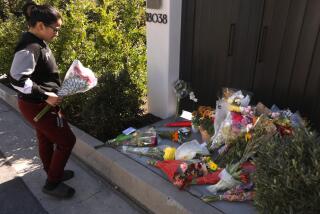Witness in Skakel Case Admits to Heroin Use
- Share via
STAMFORD, Conn. — A key prosecution witness against Kennedy nephew Michael Skakel admitted in court Wednesday that he was using heroin when he told a grand jury Skakel had confessed to the 1975 murder of a neighbor.
But the witness--Gregory Coleman, who was a student at a Maine treatment center with Skakel when they were younger--did not recant his testimony that Skakel said he beat teenager Martha Moxley to death.
Coleman made his disclosure while under questioning at a hearing to determine whether there is enough evidence to try Skakel, who, like Moxley, was 15 at the time of the slaying in Greenwich.
Coleman said he used the drug at a hotel before he spoke to the grand jury that investigated the case from June 1998 to December 1999--a grand jury that consisted of a single judge--and recommended that Skakel be prosecuted.
“I was on drugs when I came before the grand jury,” Coleman said.
“That’s kind of scary,” Skakel lawyer Michael Sherman replied.
“Are you on drugs now?” Sherman asked.
Coleman said he wasn’t. “Give me a urine test,” he said.
“No, thanks,” Sherman said, drawing a reprimand from the judge.
Coleman also said he had used heroin and crack cocaine before a TV interview in which he said Skakel had confessed.
Wednesday’s admission surprised even Skakel’s attorney: “I think we found the weakest link,” he said after court.
State’s Atty. Jonathan Benedict said the testimony did not surprise him. He would not comment further except to note he has other witnesses to call. Benedict will also be able to question Coleman again.
Coleman’s testimony damages the prosecution, said William Dunlap, a professor of criminal law at Quinnipiac University in Hamden.
But “the fact that he was on drugs doesn’t necessarily mean he wasn’t telling the truth. It just makes it harder to believe,” he said.
At a hearing last June, Coleman testified that Skakel told him he shattered Moxley’s skull with a golf club and declared: “I’m going to get away with murder. I’m a Kennedy.”
Earlier Wednesday, a childhood friend of Moxley, Sheila McGuire, testified she was horrified when she found the teen’s body a day after Moxley was reported missing in October 1975. She said the body resembled a bloody mattress.
No arrests were made for more than 24 years. Skakel, 40, was charged in the killing in January 2000 and later arraigned as a juvenile. A judge ruled in January that Skakel should be tried as an adult.
Skakel is the son of Rushton Skakel, who is the brother of Robert F. Kennedy’s widow, Ethel.
The first probable cause hearing focused on alleged confessions Skakel made while a resident at the Elan School, a substance abuse treatment center in Poland Spring, Maine.
One student, John Higgins, said Skakel confessed to him one night 20 years ago during an erratic, tearful conversation. But Higgins admitted he lied to investigators when they first asked him about the alleged confession. He also admitted asking about a $50,000 reward in the case.
During Higgins’ testimony last year, tears trickled down Skakel’s face, but his lawyer said he was “just very upset about hearing this moron get up there and lie.”
Two other Elan students testified for the defense that they never heard Skakel confess.
Before Coleman took the stand, two police investigators testified they found pieces of a golf club near Moxley’s body and that a club of the same make was found in Skakel’s home.
Sherman suggested during cross-examination that golf clubs frequently were left in the Skakel yard, and someone else could have used the club.
More to Read
Sign up for Essential California
The most important California stories and recommendations in your inbox every morning.
You may occasionally receive promotional content from the Los Angeles Times.













